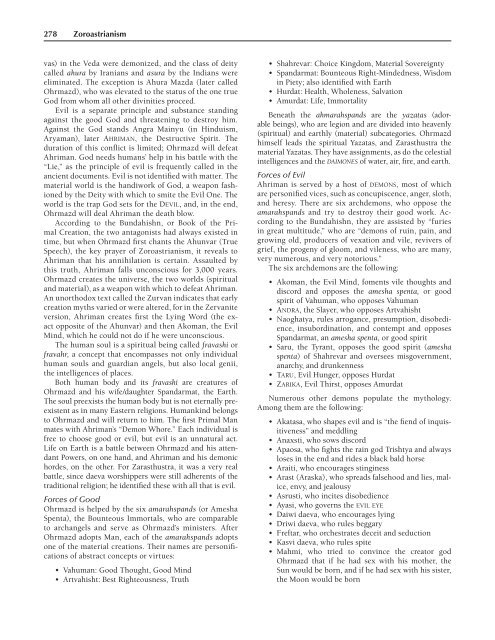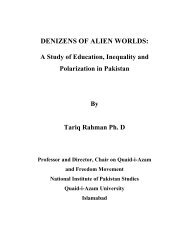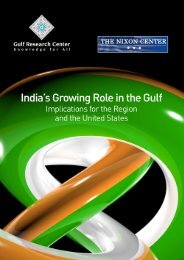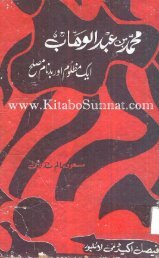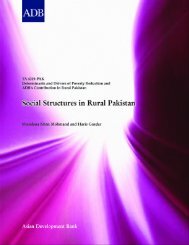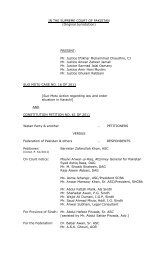The Encyclopedia Of Demons And Demonology
The Encyclopedia Of Demons And Demonology
The Encyclopedia Of Demons And Demonology
Create successful ePaper yourself
Turn your PDF publications into a flip-book with our unique Google optimized e-Paper software.
278 Zoroastrianism<br />
vas) in the Veda were demonized, and the class of deity<br />
called ahura by Iranians and asura by the Indians were<br />
eliminated. <strong>The</strong> exception is Ahura Mazda (later called<br />
Ohrmazd), who was elevated to the status of the one true<br />
God from whom all other divinities proceed.<br />
Evil is a separate principle and substance standing<br />
against the good God and threatening to destroy him.<br />
Against the God stands Angra Mainyu (in Hinduism,<br />
Aryaman), later AHRIMAN, the Destructive Spirit. <strong>The</strong><br />
duration of this conflict is limited; Ohrmazd will defeat<br />
Ahriman. God needs humans’ help in his battle with the<br />
“Lie,” as the principle of evil is frequently called in the<br />
ancient documents. Evil is not identified with matter. <strong>The</strong><br />
material world is the handiwork of God, a weapon fashioned<br />
by the Deity with which to smite the Evil One. <strong>The</strong><br />
world is the trap God sets for the DEVIL, and, in the end,<br />
Ohrmazd will deal Ahriman the death blow.<br />
According to the Bundahishn, or Book of the Primal<br />
Creation, the two antagonists had always existed in<br />
time, but when Ohrmazd first chants the Ahunvar (True<br />
Speech), the key prayer of Zoroastrianism, it reveals to<br />
Ahriman that his annihilation is certain. Assaulted by<br />
this truth, Ahriman falls unconscious for 3,000 years.<br />
Ohrmazd creates the universe, the two worlds (spiritual<br />
and material), as a weapon with which to defeat Ahriman.<br />
An unorthodox text called the Zurvan indicates that early<br />
creation myths varied or were altered, for in the Zervanite<br />
version, Ahriman creates first the Lying Word (the exact<br />
opposite of the Ahunvar) and then Akoman, the Evil<br />
Mind, which he could not do if he were unconscious.<br />
<strong>The</strong> human soul is a spiritual being called fravashi or<br />
fravahr, a concept that encompasses not only individual<br />
human souls and guardian angels, but also local genii,<br />
the intelligences of places.<br />
Both human body and its fravashi are creatures of<br />
Ohrmazd and his wife/daughter Spandarmat, the Earth.<br />
<strong>The</strong> soul preexists the human body but is not eternally preexistent<br />
as in many Eastern religions. Humankind belongs<br />
to Ohrmazd and will return to him. <strong>The</strong> first Primal Man<br />
mates with Ahriman’s “Demon Whore.” Each individual is<br />
free to choose good or evil, but evil is an unnatural act.<br />
Life on Earth is a battle between Ohrmazd and his attendant<br />
Powers, on one hand, and Ahriman and his demonic<br />
hordes, on the other. For Zarasthustra, it was a very real<br />
battle, since daeva worshippers were still adherents of the<br />
traditional religion; he identified these with all that is evil.<br />
Forces of Good<br />
Ohrmazd is helped by the six amarahspands (or Amesha<br />
Spenta), the Bounteous Immortals, who are comparable<br />
to archangels and serve as Ohrmazd’s ministers. After<br />
Ohrmazd adopts Man, each of the amarahspands adopts<br />
one of the material creations. <strong>The</strong>ir names are personifications<br />
of abstract concepts or virtues:<br />
• Vahuman: Good Thought, Good Mind<br />
• Artvahisht: Best Righteousness, Truth<br />
• Shahrevar: Choice Kingdom, Material Sovereignty<br />
• Spandarmat: Bounteous Right-Mindedness, Wisdom<br />
in Piety; also identified with Earth<br />
• Hurdat: Health, Wholeness, Salvation<br />
• Amurdat: Life, Immortality<br />
Beneath the ahmarahspands are the yazatas (adorable<br />
beings), who are legion and are divided into heavenly<br />
(spiritual) and earthly (material) subcategories. Ohrmazd<br />
himself leads the spiritual Yazatas, and Zarasthustra the<br />
material Yazatas. <strong>The</strong>y have assignments, as do the celestial<br />
intelligences and the DAIMONES of water, air, fire, and earth.<br />
Forces of Evil<br />
Ahriman is served by a host of DEMONS, most of which<br />
are personified vices, such as concupiscence, anger, sloth,<br />
and heresy. <strong>The</strong>re are six archdemons, who oppose the<br />
amarahspands and try to destroy their good work. According<br />
to the Bundahishn, they are assisted by “furies<br />
in great multitude,” who are “demons of ruin, pain, and<br />
growing old, producers of vexation and vile, revivers of<br />
grief, the progeny of gloom, and vileness, who are many,<br />
very numerous, and very notorious.”<br />
<strong>The</strong> six archdemons are the following:<br />
• Akoman, the Evil Mind, foments vile thoughts and<br />
discord and opposes the amesha spenta, or good<br />
spirit of Vahuman, who opposes Vahuman<br />
• ANDRA, the Slayer, who opposes Artvahisht<br />
• Naoghatya, rules arrogance, presumption, disobedience,<br />
insubordination, and contempt and opposes<br />
Spandarmat, an amesha spenta, or good spirit<br />
• Saru, the Tyrant, opposes the good spirit (amesha<br />
spenta) of Shahrevar and oversees misgovernment,<br />
anarchy, and drunkenness<br />
• TARU, Evil Hunger, opposes Hurdat<br />
• ZARIKA, Evil Thirst, opposes Amurdat<br />
Numerous other demons populate the mythology.<br />
Among them are the following:<br />
• Akatasa, who shapes evil and is “the fiend of inquisitiveness”<br />
and meddling<br />
• Anaxsti, who sows discord<br />
• Apaosa, who fights the rain god Trishtya and always<br />
loses in the end and rides a black bald horse<br />
• Araiti, who encourages stinginess<br />
• Arast (Araska), who spreads falsehood and lies, malice,<br />
envy, and jealousy<br />
• Asrusti, who incites disobedience<br />
• Ayasi, who governs the EVIL EYE<br />
• Daiwi daeva, who encourages lying<br />
• Driwi daeva, who rules beggary<br />
• Freftar, who orchestrates deceit and seduction<br />
• Kasvi daeva, who rules spite<br />
• Mahmi, who tried to convince the creator god<br />
Ohrmazd that if he had sex with his mother, the<br />
Sun would be born, and if he had sex with his sister,<br />
the Moon would be born


